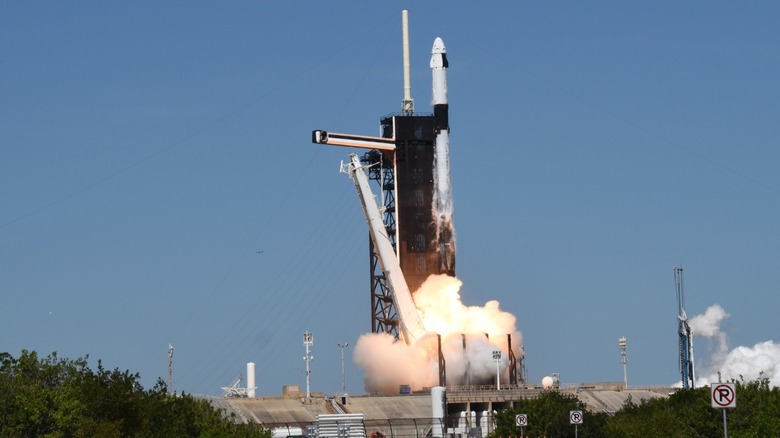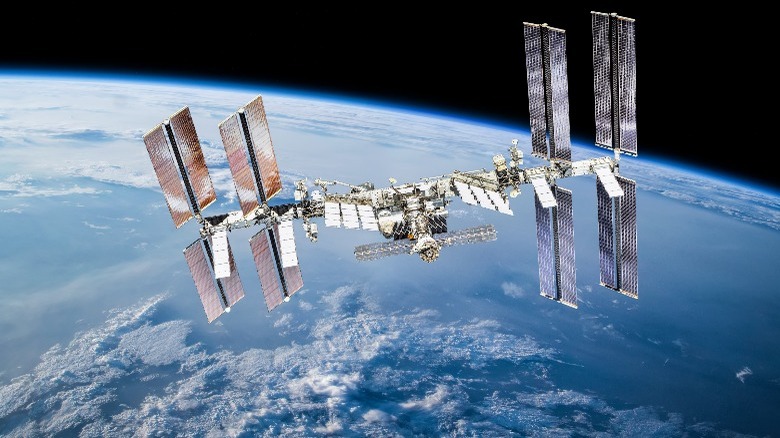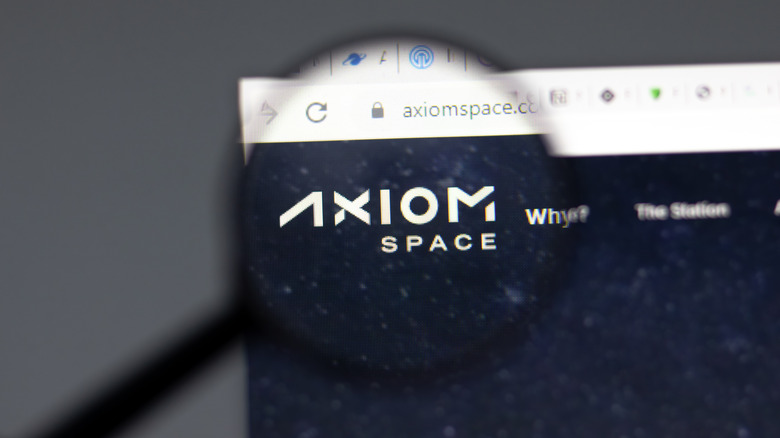How The Historic Axiom-1 Mission To The ISS Is Unique
As confirmed by NASA, on April 8, 2022, a SpaceX Falcon 9 rocket successfully took four private astronauts of the Axiom Space company from the Kennedy Space Center in Florida all the way to Earth's outer atmosphere, marking the very first space mission of its kind. The mission Axiom-1 (Ax-1) is intended to be the very first to place private citizens onto the International Space Station (ISS) for a period of time greater than eight days. As noted by Ars Technica, this launch also marked the sixth successful human flight on a SpaceX Dragon spacecraft – marking 22 private astronauts flown to space on a SpaceX-engineered transport in the last two years.
According to Teslarati, the Axiom-1 Mission was initially planned to launch in late 2021. However, it was delayed several times over the course of the last few months, and only some of those delays were explained. It experienced three delays in the month of April alone — from April 1 to April 3, then to April 6, and finally to April 8. That said, safety precautions were most likely observed and prioritized to their fullest extent for this mission, which bodes well given that SpaceX has experienced several catastrophic rocket failures in the past. The Axiom-1 crew is slated to dock on the International Space Station on April 9, 2022, at 7:45 a.m. Eastern Time.
Why is this mission historic?
Axiom-1 is the first private space flight to the International Space Station, which has previously only been a destination for NASA and other government space agencies in Russia, Japan, Canada, and the countries that are members of the European Space Agency. It could mark the first in many private space ventures to the low Earth orbit station, and it comes ahead of Axiom's plan to bring a new module to the ISS in 2024, which could help modernize the hardware that already exists on the station, and it could also pave a way for the company to begin launching customers to the station in the near future.
The mission is led by former NASA astronaut Michael López-Alegría, who has already spent time in space over the course of a long career with NASA dating back to STS-73 in 1995. He was also the Commander of the 14th Expedition to the ISS in September 2006. His Axiom-1 crew consists of a pilot, Larry Connor, and two specialists, Eytan Stibbe, and Mark Pathy.
Unlike López-Alegría, the other three private astronauts are stretching their space legs for the first time. Larry Connor is an American entrepreneur who runs a real estate investment firm, called the Connor Group, out of Dayton, Ohio. Meanwhile, Eytan Stibbe is a former Israeli Air Force pilot and entrepreneur, and Mark Pathy is the founder of Mavrik Corp, a private investment organization based out of Montréal, Canada.
Private repair and public opinion
The ISS is a modular station, which means that it's a collection of interlinking individual modules that each come from a different time and point of origin. It still includes modules "Zarya" and "Unity," both of which were originally launched in 1998. The only recent module is the Russian "Nauka" module, which famously caused a software failure that briefly spun the entire ISS in July 2021.
As tensions with Russia reach a fever pitch on a global scale due to its aggressive push into Ukraine, it makes sense for NASA to pull back from supporting joint Russian space endeavors and leave the critical work of updating and maintaining its systems to privateers who can do that work on their own time. Axiom-1 and its crew stand to prove that space missions can be completed by non-government organizations.
This hasn't dissuaded some from calling these Axiom-1 astronauts "space tourists." Ars Technica's Eric Berger reported that a former NASA astronaut texted him following a tweet he wrote about the discourse surrounding the legitimacy of the flight team, claiming that members of Axiom-1 were indeed flying to space for leisure rather than science. Berger wrote that he believed the Axiom-1's crew members were "extremely privileged," and that they are a part of this mission "because they want to, and they can afford to." He also suggested that because of the time the crew members have spent training for this mission, they are "more than space tourists," and are "well versed" in the skills and knowledge they need to fly the craft to the station and the work aboard the station once they arrive.
Why is the Axiom Space company important?
Axiom Space is a private space corporation that was founded in Houston, Texas, in 2016 by former NASA program manager Michael Suffredini and former engineering services contractor Dr. Kam Ghaffarian. Both private organizers have a long track record of working alongside NASA; selling technology, training, and other services directly to members of NASA, including those operating on the ISS. Since the company's founding, it has expanded to over 372 employees, according to its LinkedIn page.
The company is primarily concerned with designing and constructing its own space station, called the Axiom Station, which is technically a series of modules for the existing ISS and is set to begin in-space construction in 2024. The first module, AxH1, will provide habitation for four crew members. A fully constructed Axiom Station can theoretically create new pathways for commercial spaceflight to become viable among consumers.
Additionally, with a privatized ISS taken out of NASA's hands, the American agency could then redirect its attention and resources to other matters. Namely, it could support additional missions to the Moon, which could then pave the way for future missions to Mars. This is most likely why NASA is currently allowing private corporations such as Axiom to go where no private citizen has gone before.


